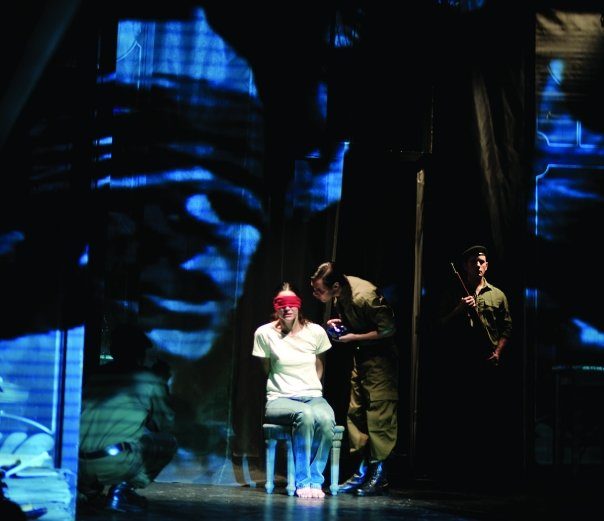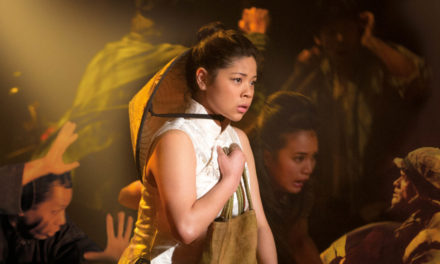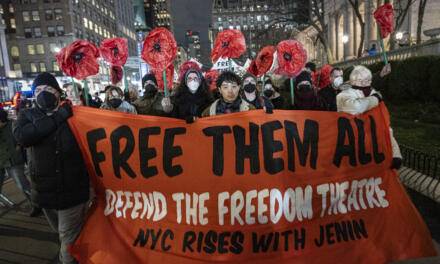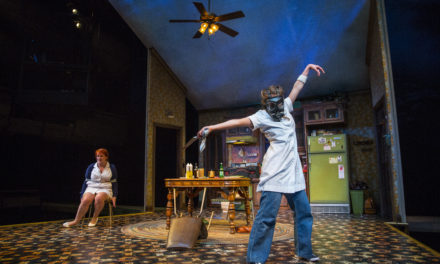This interview between OBIE-winning director and theater maker Katie Pearl and OBIE-winning text-builder/playwright Caridad Svich kicks off a new Lark blog salon curated by Svich called “Stages of Resistance.”
This interview focuses on the collaboration between Pearl and Svich on the latter’s new play Town Hall.
KATIE PEARL: In your new play Town Hall, which has a NoPassport theatre alliance workshop as part of The Lark’s PlaySpace program on March 9th and 10th, 2017, a group of barely connected people keep coming together, bumbling their way towards trying to achieve a sense of community. The play really captures something essential about the feelings of loss and lostness that many of us are experiencing under this new Trump administration—it feels very true to my own experience in the world right now. But I know you wrote the first version of this play during the summer of 2016. It occurs to me, uncomfortably so, that even though it feels like everything is changing in my world as a result of Trump coming in, the baseline realities the play taps into, and the questions it raises, have been constant and present for a long time.
CARIDAD SVICH: I think so, yes. We can talk about the actual writing process and the physical “when” of a play’s coming into being as black lines against the measure of time which is the white page, and so forth but… of course plays often start earlier. Weeks, months and years before. There have been many triggers, as it were, for the making of this play, and they do feel connected to the “now” we are in. Among them are the 1999 Battle of Seattle WTO protests and the fall-out of Occupy Wall Street and the indignados movements… how quickly movements like these that critique neoliberal market-driven societal structures and whose focus are squarely on class, economic inequities, and the mishandling of the resources (human and environmental) of our planet tend to get squashed by the very forces to which they are in opposition… how easily it seems as if the demand for the possibility of new ways of living ethically in society are subsumed and even “forgotten” in the willful inescapable parade of seeming progress – so indebted (in all senses) market-driven societies are to the market.
KP: And it does seem the four who gather in this Town Hall are victims of that seeming progress. Shell-shocked, actually, by the fallout from it. I’m interested in the make-up of this foursome in the play. You are very intentional about casting a multi-ethnic group people. Can you talk about why that’s important to you specifically? Is it simply about equity and inclusion (I’m sure it isn’t!), or is there more to it than that?
CS: It is important to me always in my work that casting is inclusive in all senses. In a great portion of the work that I have been making since 2013, save for isolated exceptions and usually ones having to do with the making of pieces that are character-based in a photo-realistic sense or very specific commissions I have had, I have stressed in my work with collaborators that I see the environment in which the text breathes as an open one. There is a script. There are words that will be said. Yes. I am not doing away with text. I have a very particular way of thinking about shape and sound, meaning and affect, white space and no space, and how the score is to be played and/or decoded in performance. But we—all those on the creative team (and by extension, those in the audience)— are all invited to share in the dream-making, because there are very little if any directions in the text as to how to go about finding the vocabulary of the world of the play. What is that expression about directing? Some plays are discovered and others are propped up? I prefer the former. And the more life experience is in the room, the richer the process of discovery is and the richer the discovery is itself.
KP: You and I both share an interest in discovery that is located in the spaces between things—between performer and audience of course, but also between performer and space, audience and space, text and performer, object and text… I think here you’re getting at some space that lives between the actor’s body and the actor’s self, or how a character’s (actor’s) body is read by an audience and who the character (actor) actually is.
CS: I would start by saying I am interested in the space between what is seen and what is not seen. On an ontological level, theatre is always an abstraction. Signs are sent through the air, through the body, and are caught in the mind’s eye of the audience. Even if the signs are as simple as five chairs and a table and house lights. And maybe a window. It is a porous field. The reality of bodies inside the porous field of the abstract nature of theatre interests me, which means that in a piece of theatre where there are voices being embodied – like instruments in a quartet – the selection of instruments affects everything.
My work has nearly always, from the beginning, been about countering essentialized notions of the self in society. Not an erasure of the self. But I suppose, yes, a desire for the self/vs onstage to be at any moment – and I think this is true of acting – in radical processes of transformation, and open to potentiality. The invitation in the room is to all of the humanity. I know this may seem controversial, but I am interested in not restricting the constructed self on stage (and in life) to an essentialist reading of being and/or representing a fixed, stable identity.
I don’t think this is a romantic notion, by the way. It may be idealistic. But not romantic. My parents are immigrants. I am first generation American. I will never know the true embodiment of having to leave behind countries, languages, families to make a new life somewhere else. I have lived with my family stories all of my life. But the act of remaking, reimagining, that happens every time I have moved from one state to the next, found myself as a writer in the South, or fell in love with the blues and roots music at the same time that I was enchanted by Bowie and Patti Smith (two artful re-makers of self). A student of mine, in her 20s, of Latinx background, says she feels a kinship with old time rockabilly music. She feels at home listening to Gene Vincent and Buddy Holly. We find our tribes. We find who we are. And we may not be who we think, or for that matter, whom others think we are by virtue of “obvious” affinities.
KP: And in Town Hall specifically?
CS: In Town Hall, everyone in the piece is in between. In the act of collectivity, and making a new society. How are we “us” in a room? In a theatre? How do a group of strangers come together and make a play and go through tons of conflict resolution in the space of three hours of rehearsal? How does the art object hold us, take care of us, and maybe allow us to see each other again, as who we are and who we might be?
Let us acknowledge, yes, histories of oppression. But must our present day societies be caught in cycles of oppression and countering oppression? Are there other ways to live? To be in the world? Can we create new spaces of being that move past the markets and codes that restrict and choose to define us and by which sometimes we define themselves?
KP: Is there an action you are hoping for that will be the result of producing/being in/working on/ watching this show?
CS: I think the call to action is within. The piece of theatre makes the space for that question – the call – to be felt. Hopefully. And perhaps the next day and the day after that or five years later, you offer someone your hand. Out of love. Out of kindness. Without asking anything in return. Maybe a smile. Or a shared feeling that we are not bound to the systems we make. We can make new ones if the ones that are in existence fail us. The only thing to which we are bound is the volatility and precarity of nature and our respectful co-existence with it.
I worry actually, and this may seem paradoxical to the guiding spirit of Town Hall, that suddenly there’s this feeling in our arts culture, in the U.S. especially right at this moment, that all plays, if they are to have “value,” must be “about” the state of the nation from a top-down perspective. Where’s the next play about Trump? Or about Bannon or the Heritage Foundation? The reason I worry about this on a macro level is that I think at root several things are at work:
- A. As writers and writers in theatre, when are we NOT responding to and reflecting on the times in which we live? Is the assumption being made somewhere in our desire for urgent, rapid response theatre (which I have nothing against, by the way, but…) that a play that is not ostensibly, myopically and mimetically “about” some one thing or someone irresponsible and therefore irrelevant?
- B. Who gets to decide what is “worthy” and “relevant?” What are hierarchical systems or will be set in place to determine the validity of a work of art? And is art’s work only then utilitarian? Only worth something in market-driven culture by virtue of its ability to offer social commentary? Are there not other “values” and “currencies” to be considered?
- C. If every play must need be about some one thing or someone, doesn’t this mean that that some one thing or someone has therefore colonized your narrative, and delimited the free and open field of the imagination?
This speaks towards my advocacy for the necessity of open systems rather than the reification of closed systems, which has something to do with my own personal wrestling match with the minor gods of realism, whom I have nothing against stylistically (in fact, sometimes this manner is quite useful for telling certain kinds of stories), but I must acknowledge have indeed colonized much of our U.S. theatre system, especially in regard to gate-keeping structures and what are often regarded as “real” plays. If I see one more ask for a character breakdown and a plot synopsis, which seem to be de rigeur in our field for a “real” play to walk through most doors and/or be listed in a catalogue, I am just going to bolt! And the reason for this is not because I have anything against the notion of a character breakdown (well, actually I do, because this goes back to closed systems, especially in regard to identities and who is allowed to play at the table of theatre and who isn’t), but more to do with the fact that not all plays contain plots that can be synopsized or cast breakdowns, for that matter.
Some plays do other things with this thing we call an “event in space.” Some plays demand to be read differently. And that’s okay. Because the form is elastic. And sturdy enough to be so. And if you wish to get a tad snarky about the reality of it all, the fact is that if you know anything about new writing for performance over the last fifty years around the world, such an ask – give me the plot synopsis and cast breakdown in a conventional sense – simply doesn’t wash. It’s merely a very convenient box that needs be ticked to funnel plays through systems that resist openness and resist, well, resistance.
Ah. Resistance. This is what I am really talking about, you see? How do you make art that truly resists the structures it critiques? You actually cannot ape those structures, because if you do, unless you are monumentally, massively clever, all you will do is re-inscribe the very structures and systems you are trying to stand up against. So, you have to resist them. We call this political art.
KP: Perhaps a show like this, that holds the audience in a structured but open framework that invites breaks/cracks/leaks/collision… can help us birth new tools. I feel like the characters in Town Hall are living in a world that lacks a moral compass. Again, this reminds me of living in Trump times. Obama really provided that compass and without him, I experience the country as being bereft. One thing I see in the play has to do with casting around for, driving towards, or hearkening backwards for that moral compass. The characters are looking for a meaningful, new way of ordering the universe around them, yet they are stuck in part because of old tools, old language, old memories. Even within the porous structure you’ve provided.
CS: I think the figures in this text are searching. They have not given up. They are not defeated. They are looking for a way through all of the afters in their lives. After wars, after human-made tragedies, after the ripple effect of the shock doctrine (to cite Naomi Klein). When did a corporation become a person? When did a person become a tax-payer? What is that great quote by Toni Morrison? “We used to be called citizens. Now we’re called tax-payers.”
I think one of the options Town Hall poses is one of active resistance. Resistant to, even though it also embraces in its own particular way, conventions like rising action and denouement. But moreover, resistant to making this a piece that can be consumed and be treated like product. I want the play to feel like that field the late John Berger describes in his essay of the same name written forty-six years ago. Presciently perhaps. That you see it, you’re not even sure what it is you’re seeing, but you suddenly are in it somehow, not looking at it, but in the field of play and you are also somewhere else, in your life, in memory, in the presence of, in the acknowledgment of the unbearable lightness (to quote Milan Kundera) of being itself.
There are conventions inherited in drama from the ancients on down. Writers were speaking to their times. As we all do. We also want to point toward the future. Because we are not content with our times. I wrote the third play in the series of plays that begins with Town Hall. And a colleague of mine responded by saying, after she read it, that “new bodies need be made in and for theatre,” by which she meant that she felt that some new bodies were being made with these plays.
Through structure, you can offer a way of seeing. Re-orient the eye/ear of the audient/spectator/witness/participant. The field of play does not need to be oriented the same way every time, as if there were only one model apartment. The beauty of drama is its plasticity and fluidity. It can do and be many things. It’s all about perception and orientation, and the tools at your disposal. What is shared is the experience. (There are tons of dramas, especially in commercial filmmaking, that adopt what I would call right-wing, neo-con narrative structures sometimes with subject matter that is counter to that! It’s just so wrong-headed!)
KP: Speaking of right-wing narratives, I’d like to look at the play for a moment through the lens of climate. In the climate conversations many of us in the theater have been having, we’ve been talking a lot about the need to “de-anthropomorphize” our story-telling, our way of looking at/understanding/talking about the earth. It occurs to me that one thing I love so much about Town Hall is that has done a version of de-anthropomorphizing by destabilizing the primacy of the individual, and by de-centering the control of the performance event. These four people are completely dependent on each other to move the play forward—the meeting forward—it seems to me. If one were to go, the whole thing would tip over and fall. Also, we are completely dependent on the audience being there. The whole show is an advocacy for the idea that the individual does not exist isolated, but is rather inextricable from a community, a system, of others.
CS: There’s a moment in Town Hall where one of the figures speaks about having an encounter with an animal, and that they see each other, and in that space of looking (like the you and I of Emmanuel Levinas), there is a moment of communication that is preverbal but is heard by one of the figures as a linguistic sign. For more than a few years now, I have been thinking about the dangers and seductions of narratives of individual heroism in drama and otherwise. Narratives that emphasize the primacy of the individual. One of the reasons I often go back, and have done so in much of my work, to the works of the ancient Greek tragedians is not because I have a mere attraction to the classics, but because in the Greeks, there is always this tension and acknowledgement of the public. The chorus. Western drama, at least, has done its best over the last several hundred years to strip away the chorus so that it seems merely like a quaint device, but in actuality, the drama is in the chorus – in the perspective, consensual, or dissensual (in Jacques Ranciere’s sense) of the body politic. I miss the chorus. Because drama does not belong to the story of one but the story of many, and yes, sometimes the story of one amongst the many. Even in a solo piece, you can have a chorus. I do believe this. If you understand how to position the storytelling to encompass the multiplicity of that solo voice within a larger context/field. We are not I/me. This is a shared thing. In theatre. In society. We are actually in it together. We are all responsible for what we have done to salvage the planet. That’s not a myth. So, we too can effect change, even if it may be too late. And yes, we are dependent on each other. Absolutely. The raft is going to sink. Use whatever metaphor you wish to use. But we are all on it.
I think as theatre-makers we offer a way of seeing through the way we use structure and form. It’s also ideological. Right? So, if you believe in closed systems, that’s what you will write, even if the subject matter is open. If you believe there can be open systems, then that’s what you create. I love when in theatre the play cannot go on without the audience. This may seem naïve, but not all works of theatre necessarily function in this manner. I love too when in theatre actors are entirely responsible for one another. At any moment, it can fail. Yes. I love that. Because it is true. Because we are human, which means we are deeply flawed creatures. At any moment, something may go wrong. Will we catch each other? Will we notice? How aware/awake are we? We are here. We are not somewhere else. If we are here for each other, then we are responsible for each other and the earth and the air and all else. Citizenship and responsibility.
This article was originally published on The Lark. Reposted with permission. Read the original article.
This post was written by the author in their personal capacity.The opinions expressed in this article are the author’s own and do not reflect the view of The Theatre Times, their staff or collaborators.
This post was written by Katie Pearl and Caridad Svich.
The views expressed here belong to the author and do not necessarily reflect our views and opinions.


![Avignon 2019: Seeking Truth: On History, Memory and Fiction in Alexandra Badea’s Points de Non-Retour [Quais de Seine]](https://thetheatretimes.com/wp-content/uploads/2019/07/quais-440x264.jpg)















